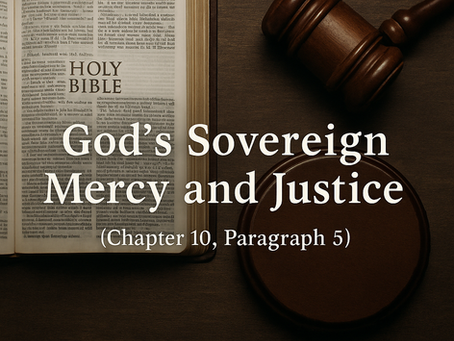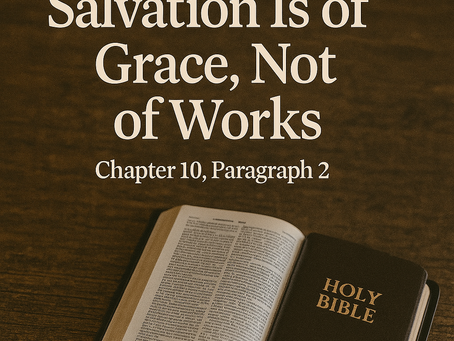top of page
Lighthouse Fellowship Reformed Church
Search
All Posts


Day 15: The Doctrine of God — His Holiness and Sovereignty
Day 15 of our 30-day study focuses on the doctrine of God, emphasizing His holiness and sovereignty. Scripture reveals the majesty of God’s character, setting Him apart as holy and ruling over all creation. Doctrine teaches us to tremble in awe and rest in His sovereign rule.
Sep 18, 20252 min read


Justified by Faith Alone in Christ Alone (Chapter 11, Paragraph 1)
Paragraph 1 defines justification as a legal act of God in which He pardons all our sins and declares us righteous—not by works, but by faith in Christ alone. This righteousness is not infused into us but imputed to us: Christ’s obedience and sacrifice are counted as ours. Justification is entirely of God’s grace and received through faith, itself a gift. The believer rests not in personal holiness or performance, but in the finished work of Christ.
Sep 18, 20252 min read


Discipline from the Father’s Hand
God the Father: Knowing the First Person of the Trinity The Loving Hand That Corrects Discipline is often misunderstood. Some see it as...
Sep 18, 20253 min read


Day 14: Doctrine as Guardrails for the Church
Doctrine acts like guardrails, keeping the church safe from drifting into error. Paul urged Timothy to “guard the deposit entrusted to you” (1 Tim. 6:20). Guardrails are not meant to restrict life but to preserve it. Sound doctrine protects believers, guides the church in holiness, and ensures faithfulness to the gospel. To reject doctrine is to drive without boundaries; to embrace it is to walk securely in truth.
Sep 17, 20252 min read


God’s Sovereign Mercy and Justice (Chapter 10, Paragraph 5)
Paragraph 5 brings the doctrine of effectual calling to its theological conclusion: God sovereignly gives saving grace to the elect while justly leaving others in their sin. He is not obligated to save all, nor is He unjust in withholding grace from some. The display of His mercy to the elect and His justice toward the rest both magnify His holiness.
Sep 17, 20252 min read


The Father of Israel: Electing a People for Himself
God the Father: Knowing the First Person of the Trinity God Chose a People for Himself The Father’s love is not reactive—it is sovereign...
Sep 17, 20253 min read


Day 13: Denominational Decline without Doctrine
Without sound doctrine, denominations drift. Many historic churches once strong in the gospel have declined because they traded truth for cultural acceptance. Paul warned that the church must “hold fast the faithful word” (Titus 1:9). When doctrine is discarded, holiness fades and decline follows. But when truth is upheld, churches remain vibrant and faithful.
Sep 16, 20252 min read


The Just Judgment of God on the Non-Elect (Chapter 10, Paragraph 4)
Paragraph 4 affirms a sobering truth: not all who hear the gospel are saved. Some are left in their sin, never drawn by the Spirit. Though they receive the outward call of the gospel, they are not effectually called and therefore remain hardened. This is not due to any injustice in God, but to His holy and sovereign purpose. The Confession upholds God's justice and rejects any notion of divine obligation.
Sep 16, 20252 min read


The Father’s Faithfulness in a Fallen World
God the Father: Knowing the First Person of the Trinity A World in Ruins—But Not Without Hope The rebellion of Adam shattered the...
Sep 16, 20254 min read


Day 12: Rome’s Corruption & the Reformation
When the medieval church abandoned Scripture, corruption abounded. Indulgences, superstition, and man-made traditions replaced God’s truth. But through the Reformation, God restored His Word. Sola Scriptura declared that Scripture alone is the authority. Calvin, Luther, and others reminded the world that doctrine is life. The Reformation shows that whenever truth is lost, reformation must come.
Sep 15, 20252 min read


God’s Grace to Elect Infants and the Incompetent (Chapter 10, Paragraph 3)
Paragraph 3 affirms that God's electing grace is not limited by age or mental ability. Though faith normally comes through hearing the gospel, God is able to regenerate elect infants and those mentally incapable by His Spirit apart from ordinary means. This is a statement of comfort and confidence in God's sovereignty—that He is not bound by human limitations, and His mercy reaches even those who cannot comprehend.
Sep 15, 20252 min read


The Father’s Covenant with Adam
God the Father: Knowing the First Person of the Trinity Not Just a Relationship, But a Covenant When God created Adam, He did not merely...
Sep 15, 20253 min read


Day 11: Pragmatism vs. Truth
Paul warns in 2 Timothy 4:3–4 that people will not endure sound doctrine but will seek teachers to satisfy itching ears. This is the spirit of pragmatism—choosing what “works” or feels good over what is true. Calvin warned that whenever men turn aside from God’s Word, they “turn to vanity.” Sound doctrine, not pragmatism, builds faithful churches. The truth may not always please, but it always saves.
Sep 14, 20252 min read


Salvation Is of Grace, Not of Works (Chapter 10, Paragraph 2)
Paragraph 2 emphasizes that the effectual call of God is not based on anything in the sinner—not on foreseen faith, good works, or human effort. It is a gift of sovereign grace, rooted in God's eternal purpose. Though the gospel may be preached broadly, only those whom God calls inwardly will come to Christ. This call is not earned or merited—it is entirely free, motivated by God’s mercy
Sep 14, 20252 min read


Providence The Father’s Hand in Every Detail
Providence is not fate or luck—it is the wise and loving hand of the Father orchestrating all things. This post explores how the Father governs every moment of history, sustains every breath of life, and works all things for the good of His people and the glory of His name.
Sep 14, 20253 min read


Day 10: The Folly of “No Creed but Christ”
The phrase “No creed but Christ” sounds humble but is actually dangerous. Jude 3 commands us to contend for the faith once delivered to the saints—a body of truth, not vague feelings. Creeds and confessions summarize doctrine and protect the church from error. Calvin warned that despising doctrine is despising Christ’s teaching. To reject creeds is not to honor Christ but to invite confusion.
Sep 13, 20252 min read


The Father’s Good World and Our Rebellion
God the Father: Knowing the First Person of the Trinity It Was All Good Genesis 1 resounds with a glorious refrain: “And God saw that it...
Sep 13, 20253 min read


Day 9: False Teachers and Doctrinal Drift
False teachers distort God’s truth and cause doctrinal drift (2 Peter 2:1–3). They often cloak their lies with words that sound spiritual but deny the Master who bought us. John Owen warned that error is most dangerous when dressed in truth. The church must cling to sound doctrine to resist deception. Where truth is abandoned, holiness crumbles; but where doctrine is held fast, the church stands firm.
Sep 12, 20252 min read


The Sovereign Call That Gives Life (Chapter 10, Paragraph 1)
Paragraph 1 defines effectual calling as the sovereign and gracious act by which God brings spiritually dead sinners to life. This is not a general invitation alone, but the inward work of the Spirit applying the gospel with saving power. God calls the elect out of sin and death, enlightening their minds, renewing their wills, and drawing them to Christ. This is all of grace—apart from foreseen faith or merit.
Sep 12, 20252 min read


Father of All: What Does It Mean?
Series: God the Father: Knowing the First Person of the Trinity Is God Everyone’s Father? It’s common today to hear the phrase “we’re...
Sep 12, 20254 min read
bottom of page